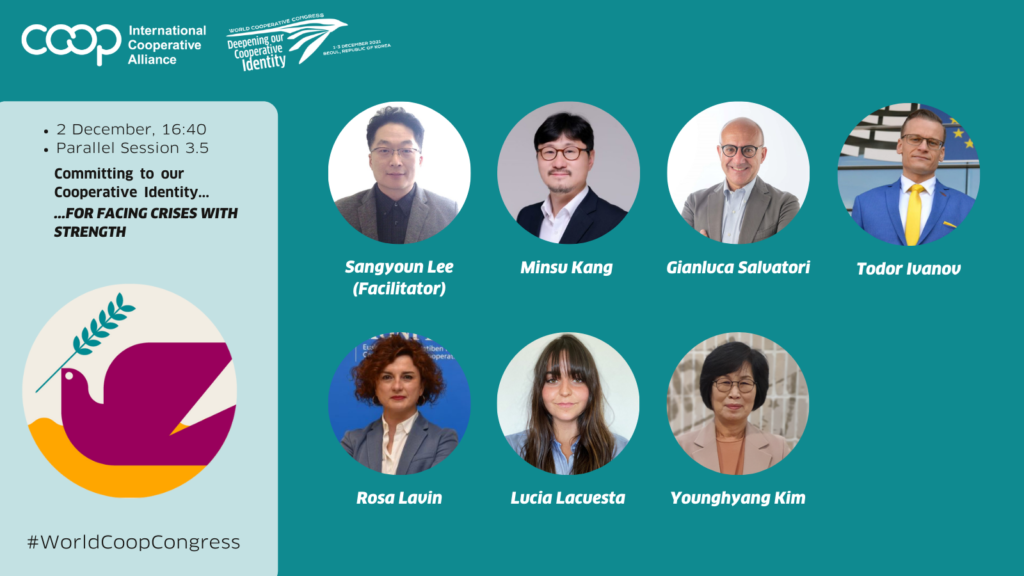
Opening session 3.5 – Committing to our Identity … for facing crises with strength – Sangyoun Lee (Professor at Korea’s Sungkonghoe University) asked delegates to consider three important questions. How do cooperatives get through crisis times, like COVID-19? What should we do more of in the future? And how do these efforts strengthen cooperative identity?
Euricse’s Giuanluca Salvatori, introduced the World Cooperative Monitor, the tenth edition of which was launched on Tuesday 30 November. The Monitor, published by Euricse and the ICA, found that cooperatives have been fast at recovering from the pandemic, and during the crisis had addressed social issues in different ways, including through providing emergency services; providing actions for members and the community; strengthening local communities; and encouraging business innovations.
But he warned that neither COVID-19 nor the 2008 financial crisis was ‘usual’. “These were not just crises within the system, but a crisis of the system, because they have challenged in a deep way, an economic model based on profit maximizationon the one hand, and civil society minimisation on the other,” he said.
Mr Salvatori added thatover the last few years of the crisis, there has been a repositioning of shareholder companies, who now talk about social responsibility. “Cooperatives are no longer the only ones taking the task of combining economic mission and social mission … all organisations today are challenged to show their social and environmental impact,” he said.
But he believes that cooperatives can set the bar higher, and should develop their own metrics to show that cooperatives “are different, and are better at achieving social and environmental goals”.
“We need to create our own model of interpreting and measuring social impact, instead of being subjected to the model adopted by the ordinary shareholder companies,” he added.
Minsu Kang, Director of the Seoul Cooperative Support Center, spoke about how Korean cooperatives responded to the crisis, and highlighted their resilience. Cooperatives “believe in the dignity of mankind – that brings us together, and makes us stronger”.
He spoke about the Zero employment adjustment campaign, which resulted in 231 social economy enterprises joining a declaration that they would not lay off a single person. This was helped by an emergency fund, which raised 630m Korean won that was used to help organisations pay rent. He also spoke about how cooperatives and the civil society gave emergency assistance to Daegu, the first region to be hit hard by Covid 19, and how cooperatives collaborated to create products to sell together during times of very low revenue caused by the pandemic.
He described how post-COVID-19 there was an opportunity for society to change direction. “Corporations are different from cooperatives, but I think that every enterprise, every organization has to change and I think COVID-19 can provide the catalyst to change – the cooperative movement can lead this.”
Lucia Lacuesta, from the Basque Country, shared her personal experience of how her cooperative has coped with COVID-19, and the generational gap she has witnessed as a 22-year-old. Ms Lacuesta is in the last year of a team entrepreneurship degree with Mondragon University, an alternative educational model based on learning by doing. “The greatest learning experience for me is being responsible for my own achievements and failures,” she said, describing how she and fellow learners set up a sex education app for Korea during the pandemic.
She also emphasised the importance of diversity in cooperatives and expressed frustration at the lack of information about cooperatives available to young people. Cooperativsm “is not attractive or clear for the people in my generation,” she said. “Youth is very important for the future of cooperativism, but it should be also for the present. We need to open the doors of cooperativism to young people and to start an intergenerational dialogue from both sides.”
Also from the Basque Country was Iñaki Nubla, director of KONFEKOOP, the Basque Cooperatives Confederation. During the pandemic, KONFEKOOP has supported its members by setting up a direct telephone line and an email address to talk to their member co-ops, keeping them up to date and helping them access finance. Cooperatives in the Basque Country maintained employment during the crisis, he added, sometimes by switching to producing new products to respond to member’s needs.
Younghyang Kim, President of Dure Consumer’s Cooperative Union, one of four major consumer cooperatives in Korea, introduced her organisation, a group of regional consumer cooperatives that are based on grassroots activities. She highlighted how Dure “encouraged producers and consumers to come together so they have direct communication, which enables them to have a sustainable future together”. This included international import links, such as with the Philippines, Palestine and East Timor.
Ms Kim highlighted how during the pandemic, Dure demonstrated international solidarity through providing emergency relief kits to producers – such as sanitary kits and necessities packages – to producers in these areas.
Eurocoop and CCW
Delegates also heard from Todor Ivanov, who leads the secretariats of Eurocoop and CCW, who examined the effect of COVID-19 on consumer cooperatives. Mr Ivanov spoke on the impact of the pandemic on business activities; how organisations cared for members, consumers and society; the role of digitalisation; and the changes in consumer behaviour. “Change for consumer co-ops is mandatory,” he concluded. “Balance is key, as is sustainability and responsibility. There also needs to be a balance between online and offline, and co-ops must also reinforce themselves as frontrunners, not just in managing the crisis, but leading the recovery.”
